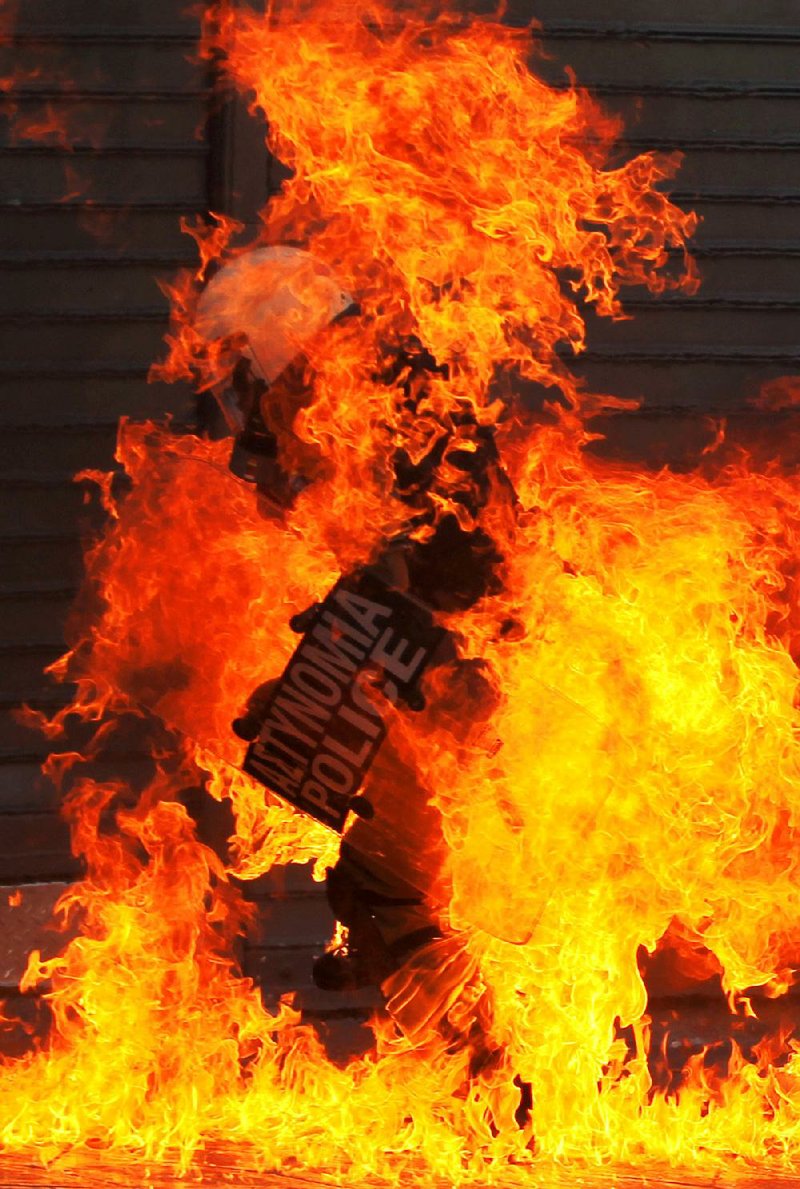ATHENS, Greece — Greek riot police clashed with hundreds of hooded youths hurling gasoline bombs Wednesday as tens of thousands of striking workers rallied against the latest round of austerity measures in Athens.
The clashes took place after an estimated crowd of more than 50,000 marched to Parliament demanding the government ignore the latest demands of the country’s creditors for additional cuts to pay, pensions and benefits.
Police fired tear gas and pepper spray against demonstrators who used stones and bottles as weapons and set fire to garbage bins and portable kiosks in central Syntagma Square.
The nationwide strike, called by the country’s two biggest private- and publicsector unions, is the first such action since the country’s conservative-led coalition government of Prime Minister Antonis Samaras was formed in June.
As the strike got under way Wednesday, Samaras and Finance Minister Yannis Stournaras reached an agreement on a $14.87 billion package of spending cuts demanded by the country’s international lenders — the International Monetary Fund, the European Central Bank and the European Commission. The cuts are a requirement for the release of nearly $40.7 billion in financial aid that the country needs to stay solvent.
“The strike marks the beginning of what is likely to be a tough time for Samaras as demonstrations and industrial action heighten in the weeks ahead,” said Wolfango Piccoli, an economist at Eurasia Group in London. “Samaras should be mainly concerned about how much time he has left to tackle all these interrelated challenges.”
Demonstrations had been peaceful throughout the morning as civil servants, teachers, professors, doctors, pharmacists, tax officers, bank employees and lawyers made their way to the center of Athens.
But violence broke out shortly after 1 p.m. as a group of people wearing black face masks hurled Molotov cocktails at police officers on Vassilis Sofias Street, a wide avenue abutting the Parliament building, sending bursts of flame and black smoke into the air. Crowds scattered inside Syntagma Square when similarly clad youths destroyed a tent and set part of it on fire. Police officers wielding batons responded with brief bursts of tear gas, although they had been ordered not to use it broadly as they have in previous demonstrations.
The strike came as a public backlash against austerity mounts in countries around southern Europe that have had to reach out to other countries for financial aid three years into the eurozone’s debt crisis.
On Monday in Spain, thousands of demonstrators besieged the Parliament to protest austerity measures planned by Prime Minister Mariano Rajoy.
Last week, more than half a million people marched in cities across Portugal to protest an increase in social security contributions.
The proposed cuts in Greece have rekindled anger among many Greeks. Many openly talk of increased impoverishment as the nation grapples with a third round of austerity measures in three years.
In Athens, demonstrators marched to the Parliament building chanting slogans against the IMF and declaring that they would not submit to the government’s new austerity plans.
Numerous government services across the country were shuttered for the day. In central Athens, main transportation arteries were disrupted although the subway was scheduled to stay open.
In Spain on Wednesday, the Bank of Spain warned that the country is in a deep recession.
Clashes in Madrid on Tuesday between protesters and the police led to 38 arrests and 64 injuries. Several thousand people — 6,000 according to authorities — converged on the national parliament building in central Madrid. More than 1,000 police officers blocked access to the building, forcing protesters to crowd nearby avenues. Police with batons charged at protesters at the front of the march, and some demonstrators broke down barricades and threw rocks and bottles.
Smaller demonstrations Tuesday attracted hundreds of protesters in Barcelona and Seville.
The protesters are calling for fresh elections, claiming the government’s hard-hitting austerity measures are proof the ruling Popular Party misled voters when it won power last November.
Information for this article was contributed by Christine Pirovolakis of Deutsche Presse-Agentur GmbH, Liz Alderman of The New York Times, by Maria Petrakis of Bloomberg News and by Nicholas Paphitis, Elena Becatoros and Ciaran Giles of The Associated Press.
Front Section, Pages 1 on 09/27/2012

